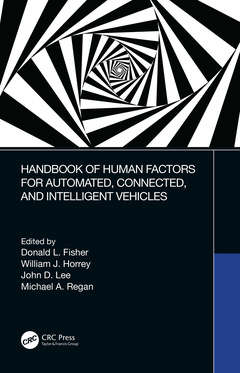Handbook of Human Factors for Automated, Connected, and Intelligent Vehicles
Coordonnateurs : Fisher Donald L., Horrey William J., Lee John D., Regan Michael A.

Handbook of Human Factors for Automated, Connected, and Intelligent Vehicles
Subject Guide: Ergonomics & Human Factors
Automobile crashes are the seventh leading cause of death worldwide, resulting in over 1.25 million deaths yearly. Automated, connected, and intelligent vehicles have the potential to reduce crashes significantly, while also reducing congestion, carbon emissions, and increasing accessibility. However, the transition could take decades. This new handbook serves a diverse community of stakeholders, including human factors researchers, transportation engineers, regulatory agencies, automobile manufacturers, fleet operators, driving instructors, vulnerable road users, and special populations. It provides information about the human driver, other road users, and human?automation interaction in a single, integrated compendium in order to ensure that automated, connected, and intelligent vehicles reach their full potential.
Features
- Addresses four major transportation challenges?crashes, congestion, carbon emissions, and accessibility?from a human factors perspective
- Discusses the role of the human operator relevant to the design, regulation, and evaluation of automated, connected, and intelligent vehicles
- Offers a broad treatment of the critical issues and technological advances for the designing of transportation systems with the driver in mind
- Presents an understanding of the human factors issues that are central to the public acceptance of these automated, connected, and intelligent vehicles
- Leverages lessons from other domains in understanding human interactions with automation
- Sets the stage for future research by defining the space of unexplored questions
Preface. Editors. Contributors. 1. Introduction. 2. Automated Driving: Decades of Research and Development Leading to Today’s Commercial Systems. 3. Driver’s Mental Model of Vehicle Automation. 4. Driver Trust in Automated, Connected, and Intelligent Vehicles. 5. Public Opinion About Automated and Self-Driving Vehicles: An International Review. 6. Workload, Distraction, and Automation. 7. Situation Awareness in Driving. 8. Allocation of Function to Humans and Automation and the Transfer of Control. 9. Driver Fitness in the Resumption of Control. 10. Driver Capabilities in the Resumption of Control. 11. Driver State Monitoring for Decreased Fitness to Drive. 12. Behavioral Adaptation. 13. Distributed Situation Awareness and Vehicle Automation: Case Study Analysis and Design Implications. 14. Human Factors Considerations in Preparing Policy and Regulation for Automated Vehicles. 15. HMI Design for Automated, Connected, and Intelligent Vehicles. 16. Human–Machine Interface Design for Fitness-Impaired Populations. 17. Automated Vehicle Design for People with Disabilities. 18. Importance of Training for Automated, Connected, and Intelligent Vehicle Systems. 19. Connected Vehicles in a Connected World: A Sociotechnical Systems Perspective. 20. Congestion and Carbon Emissions. 21. Automation Lessons from Other Domains. 22. HF Considerations When Testing and Evaluation ACIVs. 23. Techniques for Making Sense of Behavior in Complex Datasets. 24. Future Research Needs and Conclusions.
Donald L. Fisher is a Principal Technical Advisor at the Volpe National Transportation Systems Center in Cambridge, MA, a Professor Emeritus and Research Professor in the Department of Mechanical and Industrial Engineering at the University of Massachusetts Amherst, and the Director of the Arbella Insurance Human Performance Laboratory in the College of Engineering. He has published over 250 technical papers, including recent ones in the major journals in transportation, human factors, and psychology. While at the Volpe Center he has worked extensively across the modes on research designed to identify the unintended consequences of automation and, when such are identified, to develop and evaluate countermeasures. Additionally, he has developed a broad, interdisciplinary approach to understanding and remediating functional impairments in transportation, including distraction, fatigue, and alcohol. While at UMass Amherst, he served as a principal or co-principal investigator on over 30 million dollars of research and training grants, including awards from the National Science Foundation, the National Institutes of Health, the National Highway Traffic Safety Administration, MassDOT, the Arbella Insurance Group Charitable Foundation, the State Farm Mutual Automobile Insurance Company, and the New England University Transportation Center. He is a former Associate Editor of Human Factors and editor of both the recently published Handbook of Driving Simulation for Engineering, Medicine and Psychology (2011) and the Handbook of Teen and Novice Drivers (2016). He currently is a co-chair of the TRB Committee on Simulation and Measurement of Vehicle and Operator Performance. He has chaired or co-chaired a number of TRB workshops and served as a member of the National Academy of Sciences Human Factors Committee, the TRB Younger Driver Subcommittee, the joint National Research Council and Institute of Medicine Committee on the Contributi
Date de parution : 06-2020
15.6x23.4 cm
Thèmes de Handbook of Human Factors for Automated, Connected, and... :
Mots-clés :
SA Requirement; Vehicle Automation; Driver-Vehicle Interfaces; Automated Driving Systems; Automated Systems; Acc; Transfer of Control; Driving Task; Driver State; Driver State Monitoring; Automatic Emergency Braking Systems; Driver’s Mental Model; AEB; Situation Awareness Requirements; intelligent vehicles; Adaptive Automation; connected vehicles; HMI Designer; automated vehicles; Driver Distraction; carbon emissions; Non-driving Tasks; traffic congestion; Driver’s SA; Active Safety Systems; Driving Simulator; Automated Driving; Driver Drowsiness; SA; Situation Awareness; ADAS System; Lead Vehicle; Vice Versa; Electronic Stability Control; SA Global Assessment Technique; High Fidelity Driving Simulator


